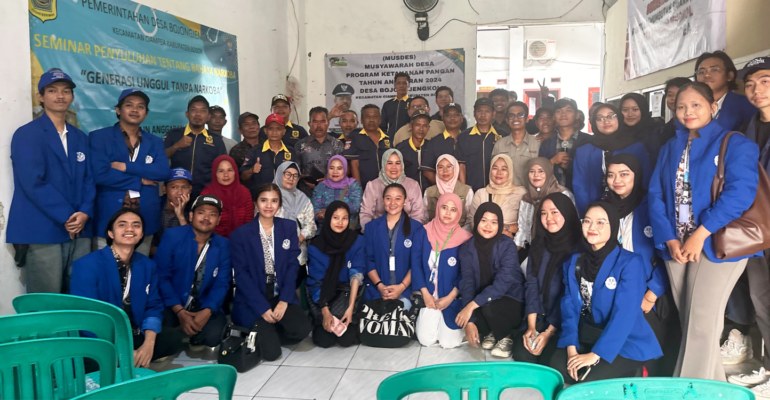Preparing for TPS 3R, KKNT Innovation IPB University Students Introduce Maggot Cultivation in Bojong Jengkol Village

In preparation for the establishment of a reduce, reuse and recycle waste management site (TPS 3R), Bojong Jengkol Village plans to form three driving groups. The maggot cultivation group is one of the drivers that focuses on the initial stages of organic waste management in the village.
Departing from this, the IPB University Innovation Thematic Real Work Lecture (KKNT) team introduced maggot cultivation for organic waste treatment to the community and village officials of Bojong Jengkol Village, Ciampea, Bogor, West Java (24/7). Through this programme, it is hoped that the community will begin to realise the value of the organic waste they produce every day.
On this occasion, Azinuddin Atras, a student of IPB University as well as the leader of the programme explained that maggot is the right choice to overcome the problem of organic waste.
“Decomposing organic waste using maggot is very efficient compared to using other methods. In addition, maggot cultivation can be a profitable business opportunity because it does not require large capital, the application is relatively cheap, and not complicated,” he said.
Azinuddin explained that maggot larvae and even adult insects have a high animal protein content. Thus, maggots can be used as additional animal feed. In addition, maggots are able to adapt to extreme environments so that maggot cultivation is very possible even for ordinary people. In addition, their life cycle is short so harvest can be done quickly.
“Maggot is a black soldier fly (BSF) larva that can act as a decomposer of organic waste by consuming it, so that waste decomposition becomes healthier, safer and does not cause piles. Maggot can reduce 80 per cent of household and industrial waste such as food factories, restaurants and even hotels,” said Azinuddin.
The Chief of Bojong Jengkol Village, Awalludin Ma’rifatullah, explained that most of the waste generated comes from households, so the volume of organic waste in Bojong Jengkol Village is quite high. He said that of the total waste generated every day, there is less than one kilogram of organic waste from each house.
The next problem, he said, is the community’s habit of disposing of waste carelessly and not centralised. This causes the environment to be disorganised and dirty, potentially becoming a source of disease.
“The Bojong Jengkol waste problem needs to be eradicated upstream to facilitate the downstream process. Students are expected to help prepare the establishment of TPS 3R drivers in Bojong Jengkol Village,” said Awalludin.
With the centralised maggot cultivation in Bojong Jengkol Village, the KKNT Innovation IPB University team and village officials are optimistic that the use of this bioconversion technology can help overcome waste problems systematically. (*/ra/Rz) (IAAS/RSL)



